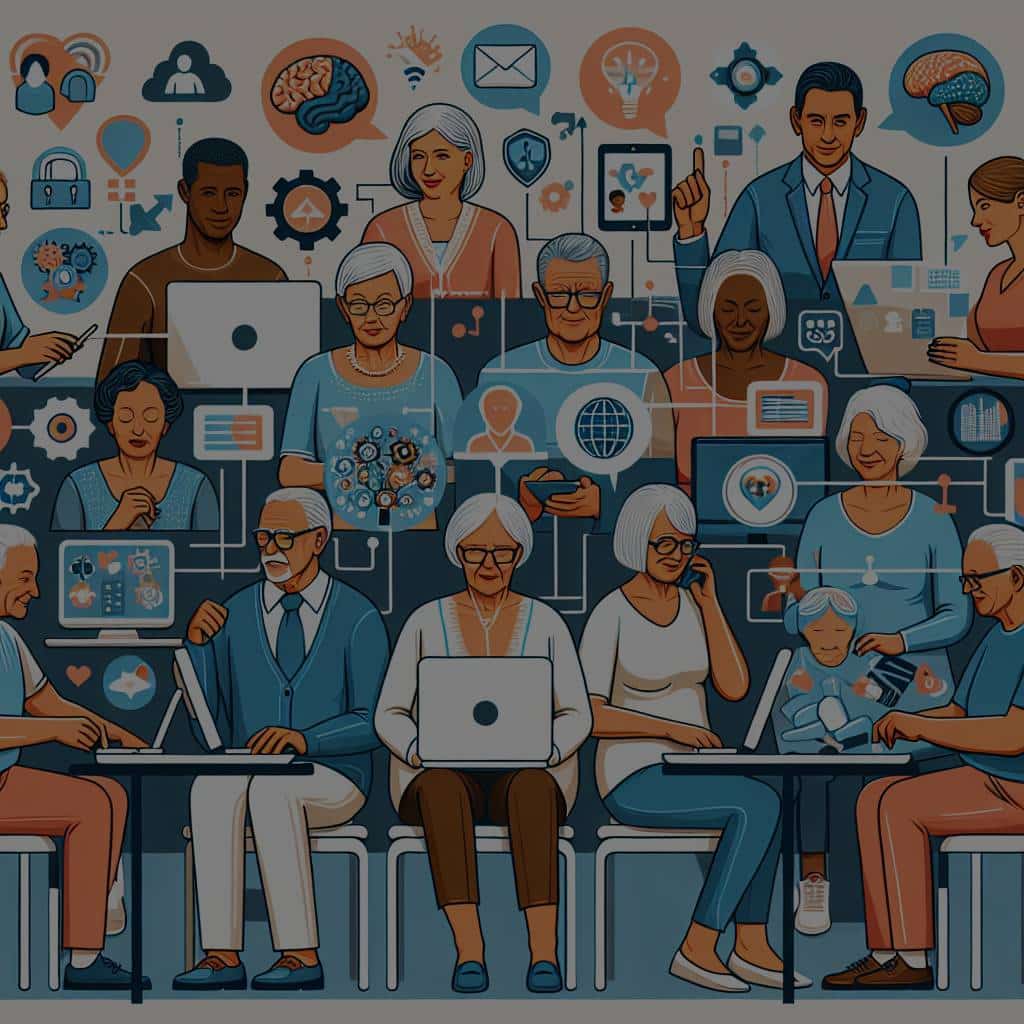How Does Participating in Digital Literacy Programs Affect Mental Agility in Seniors?

In today’s technologically driven world, it’s not just the young who are logging in and clicking away. More and more older adults are getting connected, exploring the digital landscape, from Google to social media platforms to online databases like Crossref Scholar. But this digital wave among seniors isn’t just about staying updated or killing time. It’s also about boosting mental agility and improving health, particularly mental health. According to numerous studies, participating in digital literacy programs can have profound effects on seniors’ cognitive skills, social interactivity, and sense of loneliness. Let’s delve into these fascinating benefits of digital literacy for seniors.
The Role of Digital Literacy in Enhancing Cognitive Skills
In the realm of digital literacy, mastering the use of internet technology is just the tip of the iceberg. The actual learning process involved in digital literacy programs can significantly enhance cognitive skills among older adults. Every time seniors navigate the online world, they are, in essence, flexing their mental muscles. Whether it’s browsing through Google, exploring scholarly articles on Crossref, or simply learning how to use a new app, each of these activities stimulates their brain, improving their memory, attention, and problem-solving skills.
This might interest you : How Can Electric-Assist Bicycles Promote Cardiovascular Health in Individuals with Mobility Issues?
The brain, just like any muscle, needs regular exercise to maintain its health and function. And digital literacy provides older adults with the perfect mental workout. A study published by the American Journal of Geriatric Psychiatry found that internet usage among seniors can help improve their cognitive function. The research revealed that regular internet users had twice the mental agility of infrequent users.
Digital Literacy and Social Interaction
While the internet is a vast sea of information, it is also an incredible tool for social interaction. Social media platforms, chat groups, and even online forums provide seniors with a platform to interact with their peers, family, and friends. For seniors who may be physically isolated due to health or distance, online interaction can be a lifeline, providing them with a sense of community and belonging.
Also read : What Are the Health Benefits of Ocean Swimming in Cold Water?
Digital literacy goes beyond teaching seniors how to use technology. It also instills in them the confidence to engage and interact in the digital world. A study conducted by the University of Exeter found that teaching older adults to use social media and other online tools significantly reduced feelings of loneliness and increased their sense of wellbeing.
Internet Learning as an Intervention Against Loneliness
Loneliness is a significant issue among seniors. According to the Centers for Disease Control and Prevention (CDC), over one-third of adults aged 45 and older feel lonely, and nearly one-fourth of adults aged 65 and older are considered to be socially isolated. These feelings can have detrimental effects on both physical and mental health.
However, internet learning can serve as an effective intervention against loneliness. By connecting seniors with others through social media, online forums, and even video calls, the internet can alleviate feelings of isolation. Furthermore, online platforms can provide seniors with access to a wealth of resources, such as online games, hobby communities, and educational materials, which can keep them engaged and mentally active.
Access to Health Information and Services Online
The internet is a treasure trove of health-related information. From the latest research studies on Crossref Scholar to online medical consultations, seniors who are digitally literate have the world of health information at their fingertips. Being able to access this information allows older adults to take control of their health, make informed decisions, and stay up-to-date on the latest health advisories and breakthroughs.
However, the importance of digital literacy goes beyond just being able to access information. It also involves teaching seniors how to critically evaluate the information they find online. With the rise of misinformation on the internet, it’s essential that seniors are equipped with the skills to discern credible sources and accurate information. Their health, quite literally, may depend on it.
In conclusion, participating in digital literacy programs offers immense benefits for seniors, not just in terms of staying connected and informed, but also in improving cognitive function, reducing feelings of loneliness, and empowering them to take charge of their health.
Improved Quality of Life Through Digital Skills Mastery
It’s important to note that digital literacy isn’t just about understanding technology. It encompasses a broader range of skills and knowledge that play vital roles in the daily lives of older adults. From accessing health information on PubMed and CrossRef Google to online banking and shopping, digital skills can greatly improve the quality of life for seniors.
In fact, research from a control group in a cross-sectional study shows that eHealth literacy, or the ability to seek, find, understand, and appraise health information from electronic sources, significantly contributes to seniors’ overall wellbeing. It allows them to take charge of their health, independently manage their financial affairs, and even pursue personal interests online.
Moreover, the digital divide among older adults is being bridged by digital literacy programs. These programs provide seniors with the necessary skills to comfortably navigate the online world, enhancing their sense of independence and self-sufficiency. In the digital age, these skills are no longer a luxury, but a necessity.
Fostering Social Connectedness with Digital Literacy
In addition to cognitive benefits and improved quality of life, participating in digital literacy programs can also foster social connectedness among older adults. The internet opens a world of possibilities for social interaction, from social media platforms to online community forums.
Seniors who are digitally literate have the chance to connect with relatives, old friends, and even make new ones. They can participate in online communities that align with their interests, be it cooking, gardening, or even book clubs. This not only keeps them socially engaged but also provides a sense of belonging.
Additionally, digital literacy programs can equip seniors with the skills needed to use video calling platforms, allowing them to maintain face-to-face contact with loved ones. This is especially crucial for seniors who are physically isolated due to health or distance.
In conclusion, it is evident that digital literacy plays a crucial role in enhancing the mental agility, social connectedness, and overall quality of life of older adults. It’s not just about being able to Google search or read a free article on PMC. It’s about empowering seniors to successfully navigate and engage in the digital world, promoting their cognitive health, reducing loneliness, and fostering social connectivity. Thus, digital literacy programs for seniors are not just a step towards technological proficiency, but a leap towards improved mental health and wellbeing.
